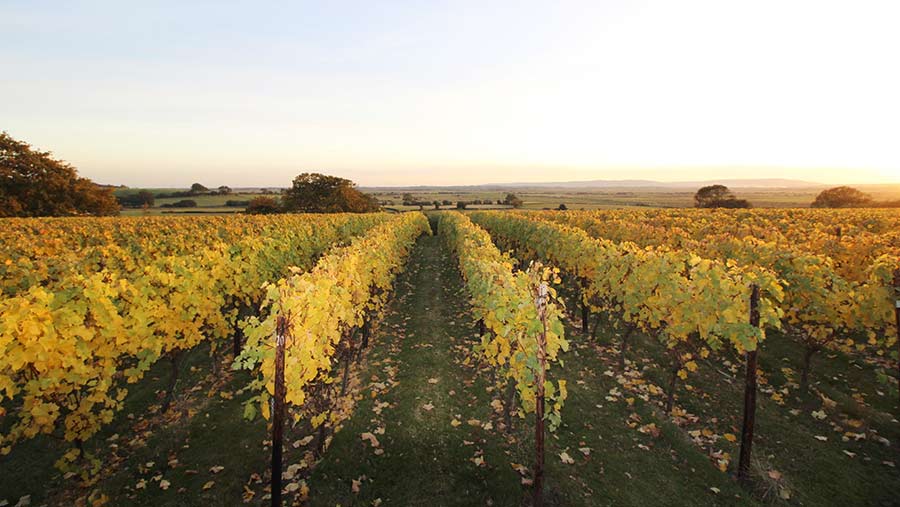Increased competition for UK farmland driven by wine sector
 A view across a Sussex vineyard sold by BTF Partnership last year © BTF Partnership
A view across a Sussex vineyard sold by BTF Partnership last year © BTF Partnership An expanding viticulture sector is driving competition for UK farmland capable of growing grapes.
Long-term tenancies and outright purchases are being coveted by the country’s biggest wine growers as the industry continues to expand.
Kent and Sussex remain the most active counties, but vineyards are not constrained to south-east England.
See also: Farmland market sees supply slump ahead of Brexit
They can now be found as far west as Pembrokeshire and as far north as Yorkshire.
Underlining the UK’s appeal, Champagne giant Taittinger is among those known to have purchased land in Kent to produce English sparkling wine.
Agents involved in acquisitions and sales say premiums above market value exist for outright purchases of plantable land, with prices ranging from about £12,000/acre to £20,000/acre.
Strong rents of up to £350/acre are being paid by wineries on 25 to 30-year farm business tenancies (FBTs) too.
What’s changed?
Savills’ Viticulture in Great Britain report says the UK land area put to vines has increased every year for a decade and now stands at about 5,600 acres.
Wine is the fastest-growing British export, but the UK still imports more than £3bn of product, predominantly from France, Italy and Spain.
Vines can be grown across much of England and Wales but soils, aspect and altitude means the supply of commercially viable vine land is finite.
A warmer climate and the growing reputation of UK vineyards has helped develop what is still a young industry.
Savills director Chris Spofforth said: “There is a recognition that there are good soils here and the climate in the South East now is akin to that of the Champagne region 30 years ago.”
Major domestic vineyards, such as Nyetimber, Biddenden and Chapel Down continue to win international quality awards, backed up by countless success stories from smaller producers.
Active buyers
Mr Spofforth said the number of buyers looking for suitable land is few in number but serious in interest.
“Two of the largest farmland sales in Kent and West Sussex last year went to viticulture,” he said. “One was an established business and another was bought with serious ambitions to plant vines.”
The specific requirements of buyers coupled with the sensitive nature of acquisitions means land tends to be expensive.
Savills says most deals are done privately. There is also a knock-on effect on the rental market.
“One of the largest tender lettings in Kent last year went to the Chapel Down winery,” Mr Spofforth added.
Paying a premium
Tom French, managing partner at BTF Partnership, has been involved in buying and selling vineyards for more than 15 years.
He says most of the largest UK brands are looking to expand through purchases, FBTs or production under contract.
“The bigger growers have expressed that they will pay a small premium over and above the market rate – perhaps £1,000 to £2,000/acre over market value for a purchase,” Mr French said.
“However, they are competing with a growing number of rollover buyers. “There’s hot competition down here and the wine growers don’t always have deep enough pockets.”
He said that a number of his clients had approached his firm to discuss contract terms or FBTs.
“Some will have the land, the skill and the labour to plant vines and will be excited about growing a new crop under contract, which adds to their diversity. It is a long-term investment though.
“Some wineries are looking for land they can take under FBTs that will command a premium over cereals, but again the terms are likely to be 25 years or more.”
